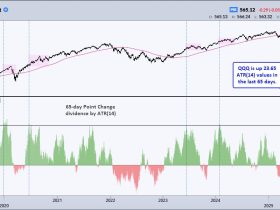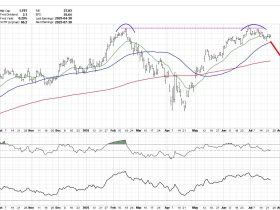Homebuilder stocks are experiencing a significant rally as markets anticipate a rate cut in September, and possibly more before the end of 2024.
What Triggered the Bullish Turn?
Earlier this week, Fed Chair Jerome Powell hinted at rate cuts later this year. He didn’t say when, but he did mention the Fed won’t wait for inflation to drop to 2% to make a move.
In the June 2023 article, Homebuilder Stocks are Soaring, But Is It a Good Time to Buy?, I noted that the homebuilding industry—specifically, D.R. Horton (DHI), Lennar (LEN), PulteGroup (PHM), and Toll Brothers (TOL)—was soaring, but technicals warned of a gradual drop in momentum. That dip took three months to fully play out, thanks to high mortgage rates and rising construction costs dampening the housing market. But then, in November, a couple of technical and fundamental catalysts converged.
Looking at SPDR S&P Homebuilders as an Industry Proxy
CHART 1. WEEKLY CHART OF SPDR S&P HOMEBUILDERS ETF (XHB). This ETF represents the homebuilder industry and gives a broad view of the largest stocks in the industry.
Note XHB includes homebuilding and homebuilding-related stocks. Not all stocks in the index are homebuilders.
Technical Bounce Off Support. Longer-term investors saw the dip as an ideal buying point for many stocks. The XHB weekly chart shows the homebuilders’ index bouncing off the 50-period Simple Moving Average (SMA). For individual stocks on a daily chart, you would see a bounce off the 200-day SMA (see green arrow pointing to the November breakout), which gets relatively close to the weekly SMA shown above.
Fundamental Catalyst. On the fundamental side of things, a huge drop in consumer prices (the first in four years), reduced lumber prices (cutting building costs), and positive earnings reports all contributed to market optimism and a breakout from the downtrend line (see blue trend line) in November.
The price action in June 2023 suggested waiting for a “sizable dip” before pulling the trigger. That dip came, and if you got in, it would have been a favorable ride.
As for this week’s rally catalyst, beginning with a similar breakout (see green arrow pointing to the July breakout) to the last one discussed above, it was Jerome Powell’s statement that the Fed may not wait for inflation to drop down to 2%. So, where are we today?
DR Horton (DHI) Surges Forward
DHI is set to keep shining in 2024. Analysts predict revenue will grow thanks to the ongoing housing shortage. You can follow DHI’s live chart here.
CHART 2. DAILY CHART OF DR HORTON. DHI doesn’t quite look like it’s topping (yet?).
DHI’s StockChartsTechnicalRank (SCTR) score just shot above the 90 line, signifying that several technical indicators are giving bullish readings across multiple timeframes. But will it hold?
DHI’s breakaway gap at $142 was followed by a strong parabolic surge, leading to a runaway gap at $164. Though there’s no indication a pullback is anywhere in sight, when it finally occurs, you might expect support at $165 (see blue dotted line), the highest swing point marking DHI’s ascent into all-time high territory, or below that, $158, the most recent and significant swing high. Below that, you might find support at the 200-day SMA (which has served as a strong support level several times in the past).
Also note that, according to the Relative Strength Index (RSI), DHI has entered “overbought” territory. And if you’re curious about DHI’s relative performance against its peers, the stock is surprisingly underperforming XHB by over -1% (see panel displaying DHI:XHB).
Toll Brothers Inc (TOL)—High-End Outperformer
TOL is poised to continue benefiting from high demand despite higher mortgage rates. A luxury home builder, TOL also has strong geographic diversification, both contributing to its growth potential. To link to TOL’s live chart, click here.
CHART 3. DAILY CHART OF TOLL BROTHERS. Pinpointing support levels can be tricky here, so it helps to bring in the volume to see where heavy trading was concentrated.
Similar to DHI, TOL’s SCTR score also jumped above the 90 line. But unlike DHI, TOL is outperforming its peers by over 12%. Pay close attention to the shooting star that appears to be forming. It indicates a strong rejection from the top, signaling a potential bearish reversal. The RSI reading is also approaching the 70 line. If it goes above 70, it could be interpreted as overbought.
Since TOL broke out of a wide and volatile trading range with numerous swing points, pinpointing support levels can be tricky. To clarify, the chart uses the Volume-by-Price indicator to identify support and resistance levels around zones of heavy trading activity.
Potential support (see blue dotted lines) can be found at $124, $116, and $106 (note that this level also marks a critical resistance level from Dec 2023 to Feb 2024). Also, pay attention to the the 200-day SMA, which should coincide with a level within this range.
PulteGroup Inc (PHM)—Second Strongest Performer
PulteGroup is currently outperforming its industry by over 11%. Despite a tough economic climate, PHM’s management is optimistic about 2024. They expect strong performance driven by a solid job market and potentially lower interest rates. Here’s a link to PHM’s live chart.
CHART 4. DAILY CHART OF PULTEGROUP. The pin bar and falling SCTR indicate it may be time for a breather.
PHM almost reached a high of $130 before sellers jumped in and pushed the stock back toward its opening price, creating a pin bar (or shooting star) formation. If it does pull back in the near term, you can find support at the rising trend line (see blue dotted line), which is currently at $112.50 and rising. Should that fail, there’s always the 200-day SMA, which, as you can see, has provided a strong support level in past dips.
Lennar Group (LEN)—Still the Laggard
Last June 2023, LEN was the laggard of the four. It is still underperforming its industry by over -2%. Despite this, its revenue rose 8% year-over-year, and a strong backlog points to a solid 2024. Analysts believe Lennar’s focus on efficiency and strong demand will support its growth. View LEN’s live chart.
CHART 5. DAILY CHART OF LENNAR GROUP. Similar to TOL, volume helped identify a strong potential support level.
The pin bar in the last session looks like it’s about to go negative. Given the messy trading range, it was necessary to use Volume-by-Price to identify a stronger potential support level at $150. The 200-day SMA may also be another support option, and it looks like it’s about to converge with the $150 mark.
Reaching the Close
Homebuilder stocks are on a roll, thanks to Fed Chair Jerome Powell hinting at upcoming rate cuts. While past rallies saw dips due to high mortgage rates and construction costs at the time, falling consumer prices, construction costs, and upcoming rate cuts (when they take place) may all serve as bullish catalysts for further growth. Keep an eye on the support levels. Even if the stocks don’t dip now, they’ll eventually have to take a breather. So, add the charts to your ChartLists and be ready to jump in when the time is right.
Disclaimer: This blog is for educational purposes only and should not be construed as financial advice. The ideas and strategies should never be used without first assessing your own personal and financial situation, or without consulting a financial professional.







